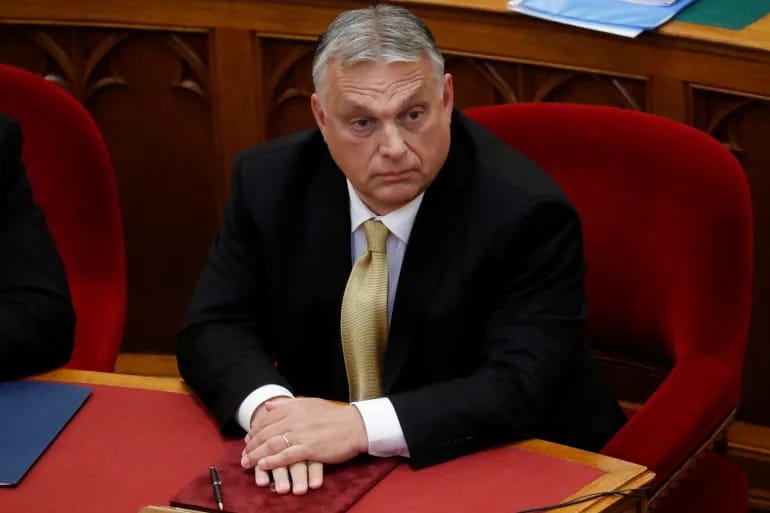In a significant blow to Ukraine’s aspirations of European Union membership, Hungarian Prime Minister Viktor Orban has thrown a formidable roadblock, signaling that Hungary may veto the initiation of membership talks during the EU leaders’ crucial meeting in mid-December. Orban’s assertion, delivered on Friday, comes just days after the European Commission recommended the commencement of negotiations, setting the stage for a potential showdown among EU member states.
Orban Deems Ukraine “In No Way Ready” for EU Membership Talks
Prime Minister Orban minced no words, declaring on his weekly radio address that Ukraine is “in no way ready” to engage in negotiations to join the world’s largest trading bloc. Orban’s stance emphasizes Hungary’s skepticism regarding Ukraine’s preparedness for EU integration, echoing concerns that have long strained relations between the two nations.
It’s crucial to note that unanimity among all EU member states is necessary for admitting a new country into the bloc, providing Hungary with a powerful veto. Orban’s reservations pose a formidable challenge to the consensus needed for Ukraine to progress in its EU ambitions.
Hungary’s Multifaceted Grievances and EU Frustrations
Orban’s government, known for its pro-Russian leanings, has consistently complicated EU efforts to support Ukraine during Moscow’s invasion. Hungary has not only refused to supply weapons to Ukraine but has also threatened to veto crucial EU financial aid packages to Kyiv. At the heart of these tensions lies Hungary’s accusation that Ukraine is violating the rights of its ethnic Hungarian minority by impeding education in the Hungarian language.
Simultaneously, Hungary finds itself embroiled in a protracted dispute with the EU over alleged rule-of-law and human rights infractions, resulting in the withholding of billions of euros in EU funds. Despite accusations of wielding its veto power for leverage, Orban denies any direct link between Hungary’s opposition to Ukraine’s EU talks and the withheld funds, asserting that his government won’t succumb to pressure from the EU.
Sources reveal growing frustration within the European Union over Hungary’s perceived obstructionist approach. Amid concerns that Budapest might attempt to block a proposed $53 billion aid package for Ukraine, EU officials suggest that they can navigate around any potential veto. This escalation adds a layer of complexity to an already tense diplomatic landscape.
Slovakia’s Potential Obstacle and EU’s Praise for Ukraine’s Progress
While Hungary takes center stage in resisting Ukraine’s EU aspirations, Brussels eyes another potential hurdle in Slovakia. Newly elected Prime Minister Robert Fico has hinted at withdrawing military support for Ukraine, branding it “one of the most corrupt countries in the world.” This adds another layer of uncertainty to the EU’s strategic goals in the region.
Against this backdrop, the European Commission’s recommendation on Wednesday commended Ukraine for demonstrating “a remarkable level of institutional strength, determination, and ability to function.” However, it emphasized that talks should only commence once Ukraine addresses concerns related to corruption, lobbying, and restrictions on national minorities’ education in their own language.
In conclusion, as the EU heads toward a pivotal meeting in December, Hungary’s veto threat looms large, injecting a dose of uncertainty into Ukraine’s long-standing pursuit of EU membership. The diplomatic maneuvering within the EU, coupled with Hungary’s domestic disputes and Slovakia’s potential resistance, creates a complex geopolitical puzzle that will undoubtedly shape the future of Ukraine’s relationship with the European Union.
















